Login
Registration enables users to use special features of this website, such as past
order histories, retained contact details for faster checkout, review submissions, and special promotions.
order histories, retained contact details for faster checkout, review submissions, and special promotions.
Forgot password?
Registration enables users to use special features of this website, such as past
order histories, retained contact details for faster checkout, review submissions, and special promotions.
order histories, retained contact details for faster checkout, review submissions, and special promotions.
Quick Order
Products
Antibodies
ELISA and Assay Kits
Research Areas
Infectious Disease
Resources
Purchasing
Reference Material
Contact Us
Location
Corporate Headquarters
Vector Laboratories, Inc.
6737 Mowry Ave
Newark, CA 94560
United States
Telephone Numbers
Customer Service: (800) 227-6666 / (650) 697-3600
Contact Us
Additional Contact Details
Login
Registration enables users to use special features of this website, such as past
order histories, retained contact details for faster checkout, review submissions, and special promotions.
order histories, retained contact details for faster checkout, review submissions, and special promotions.
Forgot password?
Registration enables users to use special features of this website, such as past
order histories, retained contact details for faster checkout, review submissions, and special promotions.
order histories, retained contact details for faster checkout, review submissions, and special promotions.
Quick Order
Search Results for “DPP4”
Pages with Related Content
DPP4 is a cell surface glycoprotein receptor that functions in immune regulation, apoptosis, signal transduction, glucose metabolism and regulation of insulin secretion. It can inactivate GLP-1, PACAP and GIP, which each stimulate insulin secretion in the pancreas and reduce glucose levels. It acts as a positive regulator of T-cell coactivation and induces T-cell proliferation and NF-kappa-B activation, and it is involved in lymphocyte-epithelial cell adhesion. In disease, DPP4 contributes to fibrosis in the liver, kidney and other organs, and it is also deregulated in a number of cancers. Furthermore, it is a target of therapies in diabetes. In immunohistochemistry, DPP4 has luminal membranous positivity in the parathyroid, small intestine, kidney, endometrium, placenta and prostate.
References: Journal of Gastroenterology. 2014. 49 (3): 481–91, PMID: 23475323; Front Immunol. 2015; 6: 386, PMID: 26284071
Viewing 1-1
of 1
site pages
for DPP4
Products
☰ Filters
Products
Antibodies
(162)
ELISA Kits
(31)
Proteins
(16)
Type
Competitive EIA
(2)
Custom
(3)
Over-Expression Lysate
(2)
Primary
(162)
Recombinant
(14)
Sandwich
(24)
Sandwich CLIA
(2)
Target
DPP4 / CD26
(206)
GPC3 / Glypican 3
(3)
Reactivity
Human
(115)
Mouse
(50)
Rat
(36)
Bat
(1)
Bovine
(7)
Chicken
(1)
Chimpanzee
(6)
Dog
(3)
Gibbon
(6)
Horse
(4)
Monkey
(7)
Orangutan
(3)
Pig
(13)
Porcine
(1)
Rabbit
(5)
Sheep
(6)
Application
IHC
(44)
IHC-Fr
(17)
IHC-P
(17)
WB
(77)
Flo
(74)
ELISA
(23)
IF
(12)
IP
(24)
Peptide-ELISA
(2)
Host
rabbit
(88)
mouse
(64)
goat
(1)
rat
(9)
Product Group
Antibodies to Coronavirus-Associated Targets
(159)
Coronavirus Antibodies Proteins cDNAs
(174)
Coronavirus Detection
(31)
ELISA Kits for Associated Targets
(31)
IHCPlus
(9)
SARS-CoV-2 Associated Proteins
(15)
Isotype
IgG
(37)
IgG1
(21)
IgG1,k
(5)
IgG2a
(22)
IgG2b
(8)
IgG2b,k
(4)
IgM
(6)
IgM,k
(2)
Clonality
monoclonal mc
(81)
polyclonal pc
(81)
Clone
007
(4)
009
(4)
11D7
(2)
134-2C2
(5)
1C5
(1)
202.36
(8)
2A6
(1)
5E8
(2)
BA5b
(9)
CC69
(1)
DPP4/910
(2)
H207-1082
(1)
M-A261
(1)
OX-61
(4)
SGPN3-1
(3)
Format
12 x 8-Well Microstrips
(3)
96-Well Microplate
(6)
96-Well Strip Plate
(22)
APC
(4)
APC Conjugated
(12)
Azide-free
(7)
Biotin Conjugated
(19)
BSA-free
(4)
Carrier-free
(1)
Concentrated
(2)
Cy3 Conjugated
(4)
Cy7 Conjugated
(4)
FITC Conjugated
(26)
HRP Conjugated
(13)
PE Conjugated
(20)
Preservative Free
(3)
Ready-to-Use
(1)
RPE Conjugated
(1)
Unconjugated
(63)
Epitope
aa29-178
(8)
aa484-728
(8)
aa631-760
(8)
aa638-767
(8)
aa357-384
(7)
aa46-74
(7)
Internal
(5)
N-Terminus
(4)
aa20-69
(4)
aa663-712
(4)
C-Terminus
(1)
Internal Region
(1)
Publications
No
(208)
Yes
(1)
Sample Type
Cell Culture Supernatants
(6)
Cell Lysates
(1)
Plasma
(24)
Saliva
(1)
Serum
(24)
Tissue Homogenates
(6)
Urine
(2)
Tag
6His-SUMO, N-terminus
(2)
Fc
(1)
Fc, N-terminus
(2)
GST
(1)
His
(5)
His,C-terminus
(1)
Myc-DDK (Flag)
(3)
Species
Human
(10)
Mouse
(3)
Rat
(2)
Source
293T Cells
(1)
Baculovirus
(1)
E. coli
(6)
HEK 293 Cells
(2)
Human Cells
(1)
Human Embryonic Kidney 293 Cells
(1)
Mammalian Cells
(3)
Wheat Germ Extract
(1)
Purification
Purified
(4)
Low Endotoxin Level
Low endotoxin level
(6)
Biologically Active
Biologically active
(1)
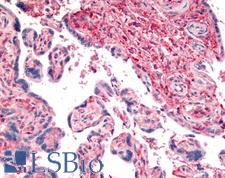
DPP4 / CD26 Rabbit anti-Human Polyclonal (Internal) Antibody
Human, Monkey
IHC, IHC-P
Unconjugated
50 µg/$395

DPP4 / CD26 Mouse anti-Human Monoclonal (11D7) Antibody
Human
Flo, IF, IHC, IHC-P, WB
Unconjugated
50 µl/$375
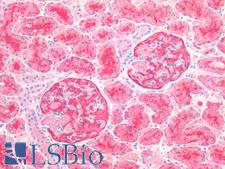
Fast Shipping
DPP4 / CD26 Rabbit anti-Human Polyclonal (Internal) Antibody
Rabbit, Bovine, Pig, Horse, Bat, Human, Monkey
IHC, IHC-P
Unconjugated
50 µg/$440
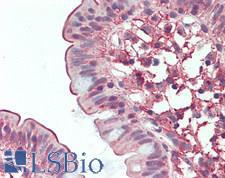
Fast Shipping
DPP4 / CD26 Rabbit anti-Human Polyclonal (Internal) Antibody
Human, Monkey
IHC, IHC-P
Unconjugated
50 µg/$395
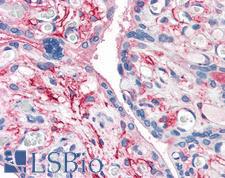
Fast Shipping
DPP4 / CD26 Rabbit anti-Human Polyclonal (Internal) Antibody
Human
IHC, IHC-P
Unconjugated
50 µg/$395
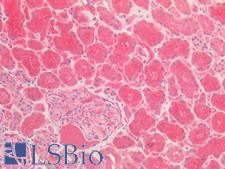
Fast Shipping
DPP4 / CD26 Rabbit anti-Human Polyclonal (N-Terminus) Antibody
Human
IHC, IHC-P
Unconjugated
50 µg/$395
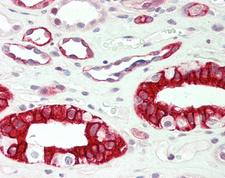
DPP4 / CD26 Rabbit anti-Human Polyclonal (aa663-712) Antibody
Human
IHC, IHC-P, WB
Unconjugated
50 µl/$460

DPP4 / CD26 Rabbit anti-Human Polyclonal (aa663-712) (Biotin) Antibody
Rabbit, Mouse, Rat, Horse, Orangutan, Gibbon, Chimpanzee, Human, Monkey
IHC, IHC-P, WB
Biotin Conjugated
100 µl/$469
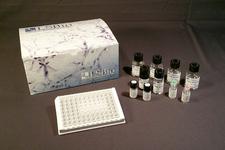
Sandwich
96-Well Microplate
Rat
0.63 - 40 ng/ml
Colorimetric - 450nm (TMB)
Plasma, Serum
1 Plate/$651

Sandwich
96-Well Strip Plate
Monkey
125 - 8000 pg/ml
Colorimetric - 450nm (TMB)
Plasma, Serum
1 Plate/$656
DPP4 / CD26 Mouse anti-Human Monoclonal (M-A261) Antibody
Human
Flo, IHC, IHC-Fr, IP
Unconjugated
0.1 mg/$274; 0.2 mg/$372
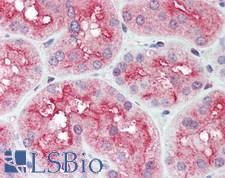
DPP4 / CD26 Rabbit anti-Human Polyclonal Antibody
Mouse, Rat, Human
IHC, IHC-P, WB
Unconjugated
50 µl/$460

DPP4 / CD26 Goat anti-Rat Polyclonal (Internal Region) Antibody
Rat
Peptide-ELISA, WB
Unconjugated
100 µg/$503
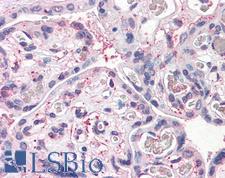
Fast Shipping
DPP4 / CD26 Rabbit anti-Human Polyclonal (N-Terminus) Antibody
Human
IHC, IHC-P
Unconjugated
50 µg/$395
DPP4 / CD26 Mouse anti-Human Monoclonal Antibody
Human
Flo, IHC, IP
Unconjugated
100 µg/$558
DPP4 / CD26 Mouse anti-Rat Monoclonal (Biotin) (OX-61) Antibody
Rat
Flo, IHC, IHC-Fr, IP, WB
Biotin Conjugated
100 µg/$355; 500 µg/$541
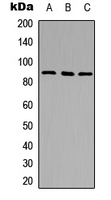
DPP4 / CD26 Rabbit anti-Human Polyclonal (C-Terminus) Antibody
Mouse, Rat, Human
WB
Unconjugated
30 µl/$255; 50 µl/$271; 100 µl/$299; 200 µl/$351
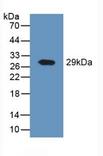
DPP4 / CD26 Rabbit anti-Human Polyclonal (aa484-728) Antibody
Pig, Human
WB
Unconjugated
100 µl/$299; 200 µl/$337; 500 µl/$463; 1 ml/$527; 2 ml/$682; 5 ml/$1,141
DPP4 / CD26 Mouse anti-Human Monoclonal (DPP4/910) Antibody
Rat, Human
Flo, IF, IHC, IHC-Fr
Unconjugated
20 µg/$371; 100 µg/$574
DPP4 / CD26 Mouse anti-Rat Monoclonal (PE) (OX-61) Antibody
Rat
Flo
PE Conjugated
50 µg/$357; 200 µg/$660
DPP4 / CD26 Mouse anti-Human Monoclonal Antibody
Human
Flo, IHC, IHC-Fr, IP
Unconjugated
100 µg/$581

E. coli
6His-SUMO, N-terminus
1 mg/$1,679; 100 µg/$598; 20 µg/$405
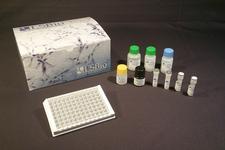
Sandwich
96-Well Microplate
Mouse
62.5 - 4000 pg/ml
Colorimetric - 450nm (TMB)
Cell Culture Supernatants, Plasma, Serum
1 Plate/$699
DPP4 / CD26 Mouse anti-Human Monoclonal (Biotin) Antibody
Human
Flo, IHC, IHC-Fr, IP
Biotin Conjugated
100 Tests/$643
DPP4 / CD26 Rabbit anti-Human Polyclonal Antibody
Human
ELISA, IHC, WB
Unconjugated
100 µg/$351
Viewing 1-25
of 209
product results
for DPP4












